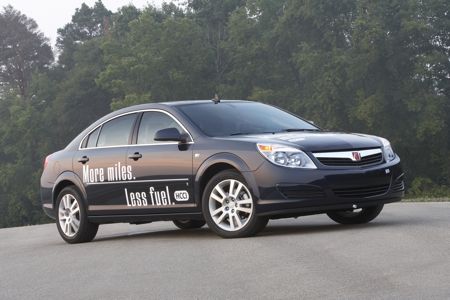HCCI – Pros, Cons, and Predictions
Mark | Apr 03, 2009 | Comments 1
Is Homogenous Charge Compression Ignition (HCCI) the next big thing for the auto industry? Will it be the perfect marriage of low emissions, high fuel economy, and performance? Probably not, but it very well could be a significant transition, that first step to pry us out of our gas-slurping speedsters without an insurmountable culture shock. [This is a follow-up to our article on HCCI from last week, Emerging Engine Technology – HCCI – What is it? Give it a read if you haven’t already or a lot of this won’t make sense.]

Saturn Aura with an HCCI engine.
In today’s auto market, a combination of desperation and advanced engine management systems has solved a lot of HCCI’s inherent problems. In May 2008, GM rolled out a Saturn Aura HCCI prototype, a hybrid of HCCI and traditional spark-ignition that delivers 15-percent gas savings with a 4-cylinder, 2.2-liter engine rated at 180 hp.
The response to the technology and the Aura is mixed. The greens don’t think it goes far enough in fuel savings and question the industry’s obsession with fossil-fuels. The performance side looks at the horsepower rating and sneers. So, let’s try to bridge the gap with the tried-and-true Pro and Con evaluation:
HCCI Pros:
- The 15-percent fuel savings is just the beginning. As more advances are made with the technology, some experts are anticipating 20 or 25% better fuel economy with HCCI. Still, 15-percent off your gas bill is not a bad start.
- The HCCI engine achieves diesel-like fuel efficiencies but with cleaner combustion and lower emissions. A substantial portion of the high cost of a modern diesel vehicle is the federally mandated exhaust system that eliminates NOx emissions. With an HCCI motor, the expensive NOx emissions systems found on new diesels aren’t necessary.
- Higher engine efficiencies are achieved with quicker, lower temperature fuel burn and the elimination of frictional pumping losses incurred in traditional throttle body spark engines. The technology is fundamentally more efficient.
Cons:
- The engine is complicated and requires a more substantial, expensive engine block to sustain the pressure increases required to sustain auto ignition. Pressure sensors, mixture composition, and temperature controls are all required to achieve reasonable performance. Bottom line – HCCI engines are incredibly complex. Of course, having said that, we’ve been driving complicated computer-controlled engines for the better part of two decades. Still, there are trade-offs with every choice.
- HCCI is still too difficult to control under high loads, meaning most HCCI engines (like the HCCI Saturn Aura concept) will likely operate in a traditional spark ignition mode at most highway speeds. Translation: HCCI won’t provide many benefits in highway fuel economy, at least not until the technology is further advanced.
- Due to their limitations under high load, HCCI engines won’t deliver serious performance for the near future. Nearly the entire American driving public demands “pep” alongside fuel and eco-friendly engines. Will the majority of the car buying public accept reduced performance in exchange for better fuel economy and emissions?
Predictions: HCCI engines will work their way into economy cars in the next 5 years. GM seems to have a big lead over most manufacturers, so they’re likely to debut an HCCI engine first. As HCCI technology advances, it may begin to catch on with larger vehicles. However, HCCI seems most likely to be limited in popularity and use. At best, HCCI will severly impact the popularity of small diesel engines. At worst, HCCI will help bolster GM’s image as an innovator.
It says here that GM should be congratulated for taking the lead in HCCI – how about a salute for the General!
Filed Under: Auto News


I did not get into all the technical aspects in the previous article but it sounds like there are some decent benefits. Area of concern is that if these engines are much more complex, it appears it would be difficult to make them cost-effective for smaller rides. Interesting news and yes, 15% off the gas bill is better than 0% any day.